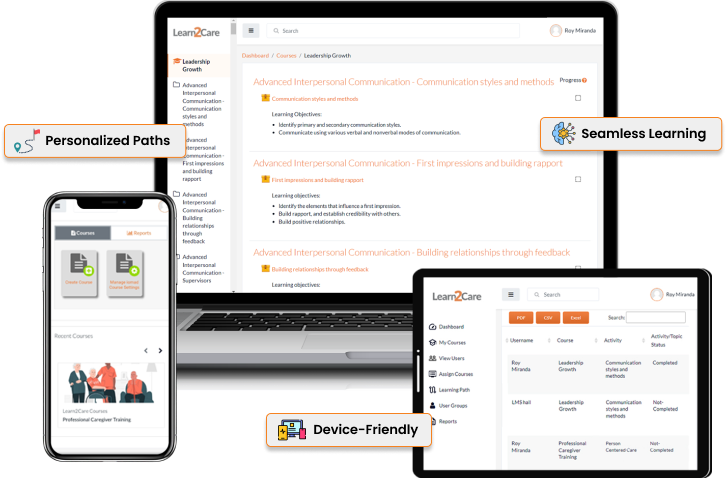
State Recommended Courses

Caregiver Training Certification
Online
Courses
Hours of Online
Content

Leadership
Courses
Initial Training Hours: 75
Annual Training Hours: 12
Initial Training Hours: Agency discretion
Annual Training Hours: Agency discretion
Comments: Although the state does not mandate caregiver training, Learn2Care recommends all caregivers receive 8 hours of initial and 8 hours of annual training to ensure core competencies and increase their skills development.
Initial Training Hours: Training topics specified; duration not specified
Annual Training Hours: 6
Initial Training Hours: Training topics specified; duration not specified
Annual Training Hours: 12
Initial Training Hours: Training topics specified; duration not specified
Annual Training Hours: 6
Disclaimer: We are committed to helping you stay informed and confident in your compliance efforts with the most accurate, up-to-date guidance we can provide. Our guides and resources are designed to support your training and compliance work, though state regulations may vary and change frequently. Please consult your state’s licensing or regulatory body for official guidance, publications, or requirements.
Alabama is experiencing a significant demographic shift, with the population aged 65 and older projected to increase substantially by 2030. In 2025, approximately 20.5% of Alabama’s population is expected to be 65 or older, up from 13% in 1995. (CBER, University of Alabama)

Background Check
Caregivers must pass ABI, FBI, and abuse registry checks before clearance.
Age Requirement
Caregivers must be at least 18 for both child and adult care positions.
Health Requirements
Most roles require immunizations and exams; adult care may vary.
Regulatory Framework
Alabama caregiving is regulated by several separate state agencies.
Career and Salary
Caregivers earn ~$26,500 yearly, or $12.73/hour on average (BLS).
Don’t let confusion around caregiver training hold you back! Our engaging eBook is packed with essential insights on Alabama’s training requirements, ensuring you meet compliance effortlessly.


Equip caregivers with essential skills tailored to your agency's needs. Upskill administrators, managers, and office staff in leadership, communication, and team management.

Access 230+ online caregivers and leadership training courses, featuring over 185 hours of engaging content to effectively train your caregivers and home care agency staff.

Create personalized learning journeys by tailoring training to specific roles and areas of expertise such as Alzheimer's care, infection control, and restorative care.

Easily track and report on assignments, completion status, quiz scores, and each caregiver's overall progress with our streamlined Progress Monitoring system.

Equip caregivers with training that complies with US CMS HHA Conditions of Participation for home health aide services, ensuring high-quality care.

Upload your own training materials or allow your team to access built-in courses, streamlining essential training in one easily accessible location.


Learn2Care offers seamless, on-the-go learning with courses accessible anytime, even with limited internet. Compatible with PCs, tablets, and phones, it provides personalized and simple learning paths tailored for caregivers.
Get quick insights into caregiver certification, training hours, and how Learn2Care simplifies the process for you.
Yes, most caregiving roles require immunizations, TB tests, and general health exams. Requirements may vary slightly between child and adult care roles.
On average, caregivers earn about $26,500 per year, or $12.73/hour, according to the Bureau of Labor Statistics.
Absolutely. Many caregiving roles offer flexible scheduling, allowing caregivers to work full-time or part-time depending on their needs.
There’s no specific state or federal limit on consecutive working days. However, caregivers must be compensated for all hours worked, including any applicable overtime.
Nope! Alabama doesn’t license private-pay home care agencies, so no mandatory training requirements exist. However, Leran2Care recommends 8 hours of initial training and 8 hours of annual to ensure caregivers deliver top-quality care and keep agencies competitive.
Not usually. Alabama doesn’t require severance pay unless it’s outlined in a caregiver’s employment contract or agency policy.
Here’s how strategic training benefits both agencies and caregivers:
Investing in caregiver development showcases your agency’s commitment to quality, compassion, and long-term success for your team and the people you serve.